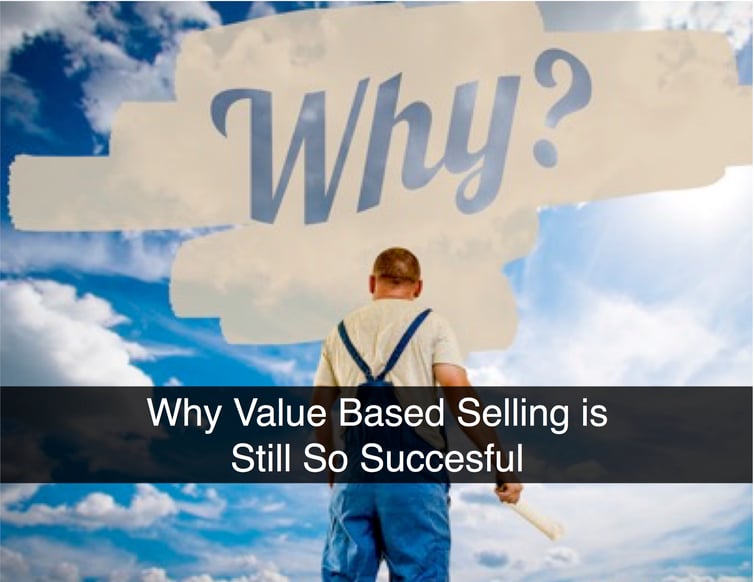
About four years ago, we published a blog post titled Why Value Based Selling is So Successful, written by Jim Heffernan, an associate and business partner. To this day, it is our most popular blog post. It opens by providing the value based selling definition as an approach “built on quantifying the impact the service makes on the customer’s financial performance,” based on a reference from Sequeira Consulting’s website.
Jim’s main premise is that value based selling works because it:
- Takes the focus off of price,
- Redirects attention to the problems being solved, and
- Measures the financial impact of those problems.
Value based sales seek first to understand the problem, and then present a solution that not only solves the problem, but does so with the greatest financial benefit to the customer. This crosses into the realm of ROI based selling: show customers that their investment in your solution will provide a positive return on investment, putting more money in their pocket.
So how do you do this?
Shift Your Focus
The first step is to stop focusing on your product. Customers care most about solving the problems they face, and not your product or any other product, for that matter. It’s essential that you truly understand their problems before talking about product.
Next, determine how much value is being lost by doing things the same old way. Then you can shift the conversation to how their business is losing value, and how you can help them make more money. Let’s illustrate how value based sales works with a non-B2B example.
Uncover the Real Problem
Have you ever hired someone to paint your house? Did you hire the person that gave you the lowest price? No? Why not?
Maybe in the past you hired painters that left a total mess or trampled your landscaping. Or they didn’t start on the date promised, and took longer than expected to finish the job. These experiences no doubt influenced your hiring decision as you tried to avoid repeating these problems.
All the contractors providing estimates are capable of painting the house, but what you’re really looking for is someone who can do the job in a more professional and satisfactory manner. In other words, painting the house is a given. Painting the house quickly, cleanly, and with no inconvenience or unexpected costs is equally important to you.
What would you do if a contractor’s price wasn’t the cheapest, but they presented a solid case that they had the lowest total cost solution? What if their references talked about neatness, timeliness, and a job well done, and stated they would hire them again? Would you consider this contractor over the lowest price solution? Of course you would.
That’s value based selling in a nutshell. Understand the problem, and then propose a solution to that problem.
Convey the Value in Solving the Problem
In B2B selling, you must often convince more than one person to buy from you. What’s worse is that you are not always able to speak directly to all the decision makers. Since your sponsor must justify the investment and persuade others to buy your solution, your challenge is to arm your sponsor with the necessary tools and justifications.
No matter how much you love your product, the other people in the buying process that haven’t seen it don’t care about it at all. Their primary concern is how any product is going to solve their business problems.
So what do you do if you can’t talk to those other buyers? Your best approach is to prepare a compelling, value based business case that shows why your solution is best and how it will deliver the highest ROI. Your sponsor can now convey the value of your solution to the buying committee, and influence the purchase decision just as you would.
Conclusion
Although value based selling has been around for a while and value selling tools have continued to evolve making it easier to take advantage of, few companies and even fewer sales reps have fully embraced it. In the end, companies and sales teams that take a value selling approach and that fully understand customer needs, clearly articulate how their solution satisfies those needs, and present a compelling business case for change, will win more deals.
Which side of that equation do you want to be on?









